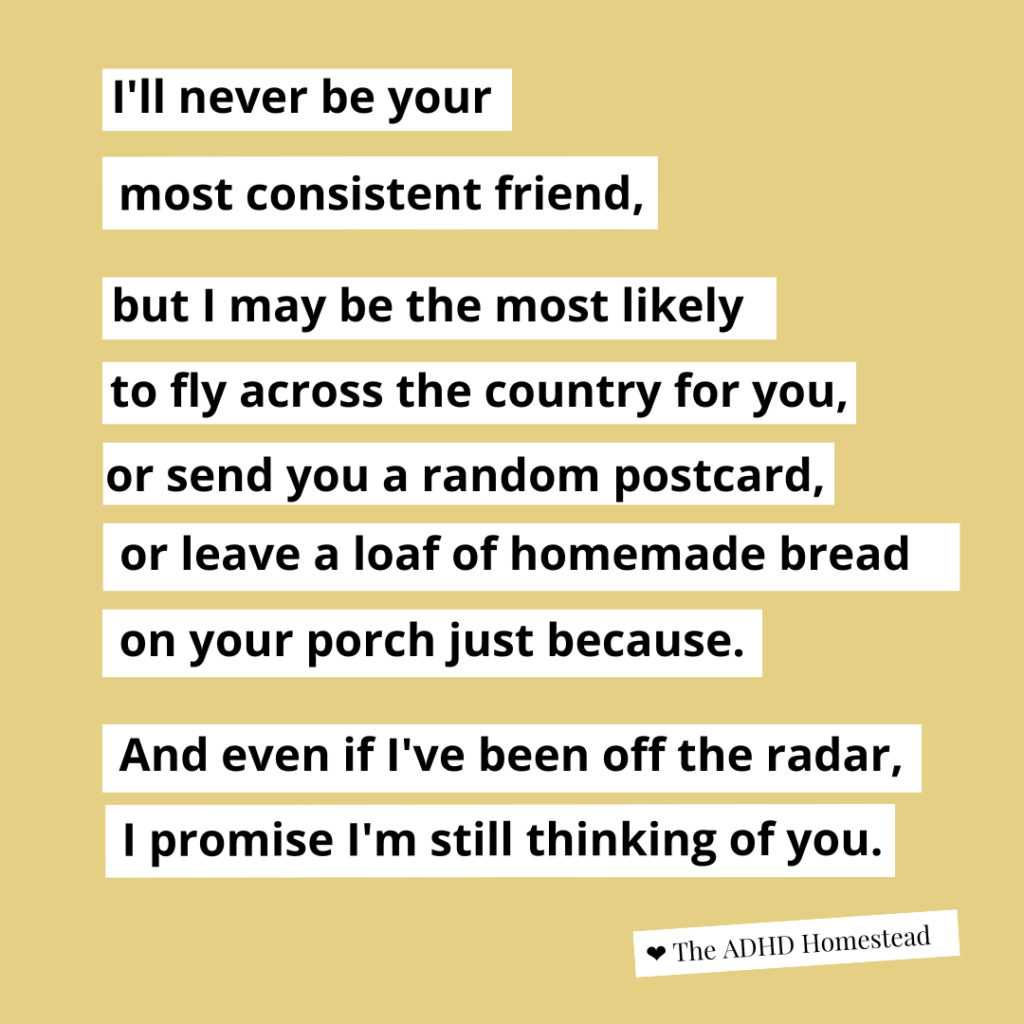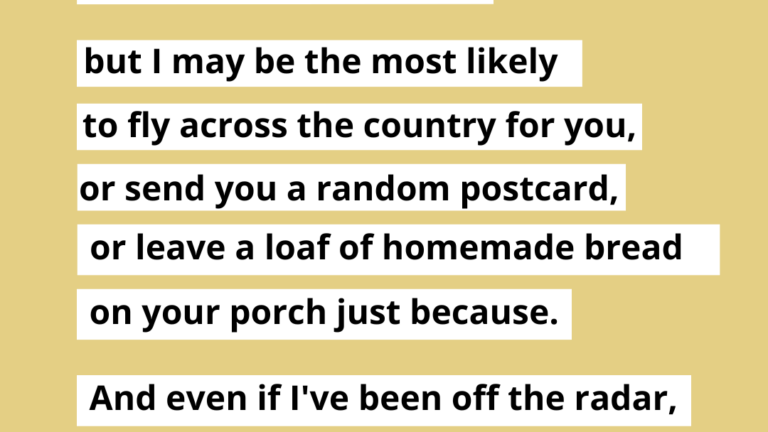Sometimes I ask myself: am I a good friend?
I don’t really know the answer, and that can be both frustrating and exhausting.
Social struggles are common for ADHDers. According to Dr. Russell Barkley in his book Taking Charge of Adult ADHD, we consistently report having fewer close friends than our peers.
I worry about this because I have nice friends. I like them, and I want them to continue liking me, but I fear no one really sees my best.
I’m getting better, though. Like anything in ADHDland, being a good friend takes learning, practice, and intentional strategies.

Here are the most valuable things I’ve learned:
- I contribute what I can, where I can.
To make up for the times when I do weird stuff, don’t know the right thing to say, or just go off the radar for a while, I capitalize on the good things I have to offer: a loaf of homemade bread just because. A magazine clipping in the mail. A ride across town in the middle of a work day. I go for the little things and hope they add up. - I’m honest about my foibles.
In his book Just Listen, Dr. Mark Goulston calls this the “stipulation gambit.” I’m forthright about character flaws that might create misunderstandings. For example, I’m terrible with the phone. If it rings unexpectedly, I’m unlikely to answer it, and I’m not shy about sharing this anxiety. I’d rather people think I’m neurotic than unconcerned. Likewise with forgetfulness, interrupting, speaking with too much intensity, and monologuing. - I spend less time on Facebook than I used to.
Scrolling through my news feed fools my brain into thinking I’m connected when I’m really not. It also sucks time away from more meaningful, one-on-one connections: writing emails and texts, arranging visits, or just having dinner together. - I’ve stopped waiting until I feel less overwhelmed.
It won’t happen. I have ADHD. It’s hard to do, but I try not to let myself use overwhelm and “being too busy” as a reason to defer social plans. - I accept that my friends are a project.
It feels like cheating to use my calendaring and task management apps to manage friendships. I hope my friends don’t figure out we’re only hanging out because I made our dinner its own project in Toodledo. Including time to think about friends and family during my weekly review feels cold. Then again, I use these systems for everything else I think is important. Why not afford friends and family the same consideration? - I write down gift ideas year-round and squirrel them away in Google Documents.
I don’t know about you, but I’m far more likely to think of the Best Gift Idea Ever in July than the week before Christmas. My brain isn’t good at generating lots of new ideas under pressure. If I give a home run gift, it’s probably something I wrote down several months earlier. Maybe I even wrote it on the bathroom mirror as I stepped out of the shower. - I’ve read several books on communication and brain science.
I read to learn about my brain, others’ brains, and how to show my best self to the world. There’s no shame in acknowledging I’m not good at something and working to get better. In Your Brain at Work, David Rock suggests learning to recognize your brain’s inherent weaknesses so you can say, “that’s just my brain” instead of going into freakout mode. It helps. Knowledge is power, especially when it comes to those big ADHD emotions that shut down your rational brain. - I try to be a good friend to myself, too.
Being kind to myself has — I begrudgingly admit — made me more attractive to others and allowed me to fill my life with good people who care about me. Mistakes happen, though, and it’s easy to become consumed by negative self-talk. In Women with Attention Deficit Disorder: Embrace Your Differences and Transform Your Life, Sari Solden advises against “over apologizing or putting yourself down.” I’ve tried to take that to heart and keep apologies simple, heartfelt, and proportionate to what happened.
How about you? How do you keep ADHD from getting the best of your personal relationships?
Image added February 8, 2023.
Hey there! Are you enjoying The ADHD Homestead?
Here's the thing: I don't like ads. I don't want to sell your attention to an advertising service run by the world's biggest data mining company. I also value my integrity and my readers' trust above all, which means I accept very few sponsorships/partnerships.
So I'm asking for your support directly. For the cost of one cup of coffee, you can help keep this site unbiased and ad-free.
Below you will find two buttons. The first lets you join our crew of Patreon pals and pledge monthly support for my work. Patrons also have access to my Audioblogs podcast. The second takes you to a simple donation page to pledge one-time or recurring support for The ADHD Homestead, no frills, no strings. Do whichever feels best for you!

